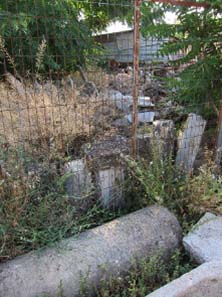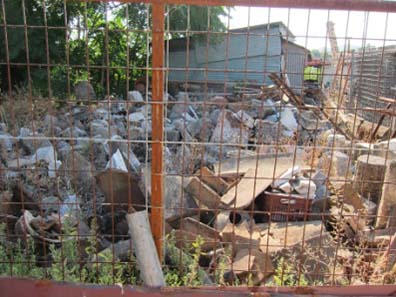by Björn Schöpe
November 17, 2011 – UNESCO and the intergovernmental organization ICCROM (International Centre for the Study of the Preservation and Restoration of Cultural Property) published the results of a survey conducted between June and September 2011. People working in museums in 136 countries had the opportunity to answer to a questionnaire. The 1490 responses sketch a rather disastrous image of the museums all over the world.
External storage area of the museum of Thebes (Greece) while the actual building is restored.
The main problem is space: Two out of three of all museums lament a drastic lack of space. Half of all museums hasn’t sufficient storage units, in one out of five objects are stored outside the designated storage areas, as in hallways or bureaus. But there is even more. For two out of five museums a solution to this problem would not be of any help: They do not dispose of sufficiently trained staff for the storage of the objects!
Hopefully this situation in Thebes (Greece) will not become a permanent one. Although according to the survey there is some chance this might happen.
In one third of the museums the responsibility of storage is unclear. Also in one out of three museums the building is in a poor state of repair and the rooms are not regularly cleaned. It might sound impossible, but in 40 percent of the museums there is a large backlog of objects to be accessioned. A quarter of the museums even has no catalogue at all, no location codes for storage units, and objects are stored on the floor.
In 20 percent of the museums doors and windows are unsecured. So, shall we rejoice because only one tenth of the museums register thefts of objects? Maybe we should ask ourselves how many thefts have not been detected because the objects stored inside had not been catalogued. One might think that the situation of poorer countries had a big impact on the whole survey, but this is not true. 25 percent of the responses came from the United States. According to the ICCROM the survey is representative of poorer and richer countries alike.
Both cultural organizations are promoting their common project Re-Org. This site assists in developing skills for the preservation of cultural objects – so one might find the stored treasures again. To intensify this work and to approach the main problems the survey has revealed, the ICCROM is now looking for partnerships and financial aid. Considering the economical situation one should not expect large sums from the national governments anyway.
The survey results and further information you can find on the site of the ICCROM.
The new project Re-Org is presented here.
In 2007 UNESCO presented its future collaboration with the ICCROM and their common goals, read the press release here.






